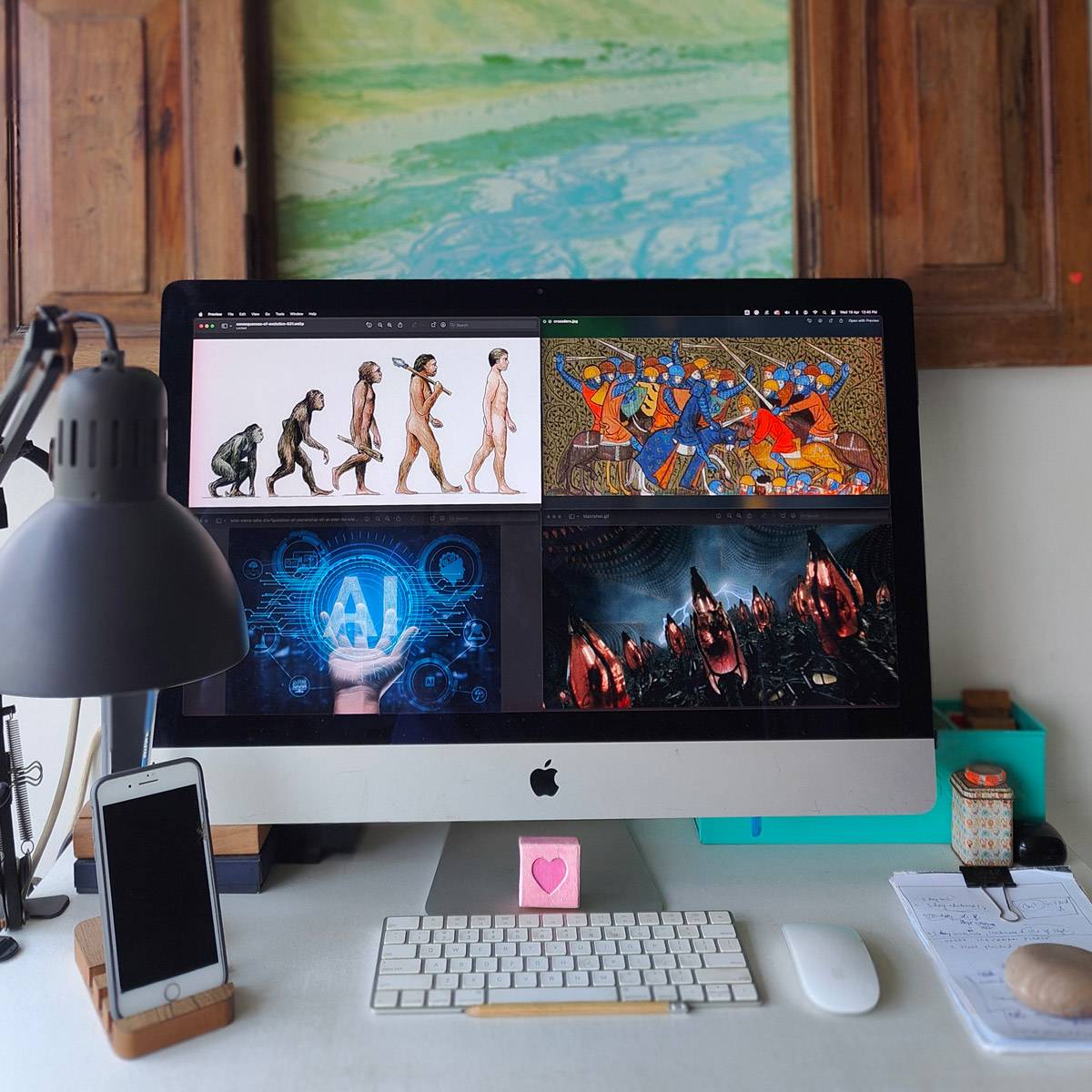
19 Apr Keeping Tabs: Cave Paintings to Cocoons
Mankind’s most amazing stumble-stone has been that keeping record of things is necessary for survival, evolution and revolutions. Ladies and gentlemen, let me tell you a story. A story about mankind’s greatest discovery – “The Art of Keeping Tabs”. Yup, you heard me right. Keeping tabs, tracking stuff, monitoring, you name it. This is what has led our evolution and revolutions.
Let’s begin some 40,000 years ago when the idea of keeping tabs was first suggested. People then en mass would probably have had some serious doubts. Like, what good would it do to keep track of things when you’re a nomad? Would it not slow them down and impede their ability to forage for berries or hunt for meat? Fair points, but did the naysayers stop the creative ones among them? Nah, not at all!
Some of them, the creative renegades, took to the caves and started drawing pictures on the rocks (and I don’t mean things “on the rocks” we do in our times). This scribbling or drawings perhaps allowed them to escape the rigmarole of memorisations, wanderings, hunting and being a slave of the circumstances. Their creative expressions on the rocks inadvertently recorded the history and stories of their time. Some of the more adventurous ones even started drawing in open spaces, but much of their work has been lost to erosion and manipulation.
Not so soon enough, around 5000 years ago, some folks realised that not all of them were artistic and they needed something more permanent. Enter phonetics, letters and alphabets. And boy oh boy, did that create a ruckus! People must have started arguing that having the written word would dull their memories. The crammers knew that this could bring an end to their era of ‘ shrutis’ [1] and ‘smritis’ [2], so they quickly decided to master the art of the written language. And that’s when everything mankind knew began to be written down, amidst debates and rules on what is worth writing and what is not. Those who did not take to writing were forgotten, buried, or cremated without any record of who-is-who among them and what they spoke or thought of when they were standing on the pedestal when they could have written all that on a tab or some paper. The written word prevailed. It still prevails to this day.
Those who mastered the art of reading and writing soon became important guys. The written word of that time was the key to ‘attention’. The power of the written word was so strong that anything written started to be more valuable than what was spoken in flesh and blood. Of all that was written, the words of the Gods became increasingly sacrosanct. The word of mere mortals stood no ground against the word of the Almighty. Perhaps that’s how the written word of the religious texts became both popular and feared in the form of holy books and scriptures. Behold the fury of the society for those who opposed the written word of the Almighty. Did we have the priests and the brahmins [3] who knew how to read and write? Did they rule the roost? You betcha!
Soon, the powers that be realised that the more people that could be brought under the word of the Lord, the better it was for their evolution (and for their coffers). Thus between 3000 to 1000 years back, the need to spread the written word far and wide to one and all became the evolutionary burden of the learned man. Did this lead to bloody massacres in the name of the written tab of Gods? Did it lead to vilification, witch-hunting, crucifixions, and killings to ensure whoever is not with them is certainly against them? All set aside, back then the written word was mostly about religion, and scores of scribes and priests were ruling the roost in producing one written record or book after another. It must have been a great time to be a scribe or priest!
1000 years passed by. Around 1400 AD or so, a thing called ‘printing press’ came to be. Lo and behold, the word of Gods could for the first time spread faster, now across continents through colonisations, aided by militarisation, missionary-isation, and proselytisation. The burden of the evolution to civilise the ‘barbarians’ was now the domain of the ‘white’ man who had the printing press.
However with the printing press something else was also spreading. Any idea worth its salt could now onwards be quickly shared with people in the form of the printed word. People, my dear friends, are not as stupid as we typically make them out to be. For the next 500 years, the people began to choose the word of the fellow man over the word of the Lord Almighty and his ‘burdened’ messenger. This ushered an era of logic, science, literature, and facts. Whoever and wherever the printed word could be printed faster, led and kept the tab of evolution and revolutions.
When the first calculators came to be, a few men were up in arms again. Many who did calculations in their minds mocked the errors that the early calculators would occasionally throw up. Some started glorifying the age old methods like abacus and slide rules. Valid points, but did the contentions stop the creative ones among us? Nah! Over time, the calculator was perfected and became a more reliable tool for keeping tabs of numbers.
Someone around 100 years back thought what a calculator could do for numbers, couldn’t something do the same for the written word? The creative community is painfully relentless! Alas, as a species we tend to see mostly the success stories only, and we see not the ones who perished in their relentlessness – the struggles of many others added the two cents to the pursuit of the success by others! To cut the long story short, they did collectively give birth to the first computing machines. The bulky machines were again mocked at by the ones who had stood fast with pen and paper, and calculators.
At this point, it would be a waste of words and time to write on how computers led to a revolution. We all have witnessed this evolution and are participants in the evolution(s) and revolution(s) brought about recently – Internet, Digitalisation, Digital Media, Social Media, E-commerce, Big Data, Mobile Devices, Cloud, Virtual Reality, Augmented Reality, and more. At each phase, a set of people among us had vehemently opposed the coming of each of the above citing how these tools were imperfect and may lead to social anarchy! Definitely, the creative community would have heeded them? Nah!
Gradually the new kid on the block “Artificial Intelligence” ushered in. Until now, the 40,000-year-old urge of mankind has been aided by ‘tools to assist’ in keeping tabs of evolution and revolution. This time, AI is not only here to “assist” but also to “create” new tabs. It is like the difference between a human-powered rickshaw and a self-driving car. With AI, we are entering an era of automated tab-keeping. It’s like having a personal assistant who can keep track of everything, without ever getting tired, forgetful or bored. It is not here to just ‘assist’ but also to ‘suggest’, ‘better’ and ‘upgrade’ the methods that until now was the burden of the man. AI is here to take that burden away from us piece by piece. AI is even out to take the burden off the ‘creative’ community. It is for the first time that the creative community is feeling the pain of how it is like to be short-changed in the race of evolution and revolution. Surely, this will deter them in their quest? Ha!
Mankind’s most amazing discovery has been that it understands that keeping a tab of things is necessary for evolution and revolutions. This is surely highly contested when any new idea is floored. But can the contentions stop the creative ones among us? I doubt it. Bring it on, ‘creative communities’ love chaos, randomness, struggles and strife. They may not be noticed among the leaders on the stage but they are here building the very foundation on which mankind evolves bit by bit, byte by byte. They usher transformations, despite the naysayers and the odds, and each time they do it like never before.
At times, I do wonder about the far reaching consequences of mankind’s quest to keep a tab of things. Do all great revolutions lead to ‘progress’ or ‘bloodshed’, either on the streets or on balance sheets? Or, is the progress taking us to the cocoons that Neo & Morpheus [4] warned us about?
[1] Shrutis: Shrutis are the primary texts of Hinduism, which are believed to have been revealed to ancient sages through divine inspiration. The term “shruti” comes from the Sanskrit word “śruti,” which means “that which is heard” or “revealed.” These texts are considered to be eternal and unchanging, and they form the foundation of Hindu philosophy, spirituality, and ritual practices.
[2] Smritis: Smritis are a collection of ancient Hindu texts that serve as a secondary source of knowledge and guidance for individuals seeking to follow Hindu traditions and customs. Smritis were originally passed down through an oral tradition and were memorized and recited by teachers and students. However, over time, some of these teachings were written down, and the written versions became the primary source of knowledge for future generations.
[3] Brahmins: Brahmins are a Hindu caste or varna traditionally associated with priestly and scholarly occupations. According to the Hindu caste system, Brahmins are considered to be at the top of the social hierarchy and are expected to be knowledgeable in Vedic scriptures and ritual practices.
[4] In the film “The Matrix“, one of the main things that Morpheus warned Neo about was the true nature of the world he was living in. Morpheus explained to Neo that the world he knew was a simulated reality created by machines to keep humans under control. Morpheus also warned Neo about the dangers of the agents (AI), who were powerful computer programs that acted as enforcers for the machines. The agents were tasked with preventing humans from discovering the truth, and they would stop at nothing to eliminate anyone who posed a threat to the system.
P.S.: If you liked this post, then you may consider reading Roti Kapda Makaan – The modern context, To Gene or To Meme, That is the question , and Attention Economy & Attention Syndrome also



No Comments